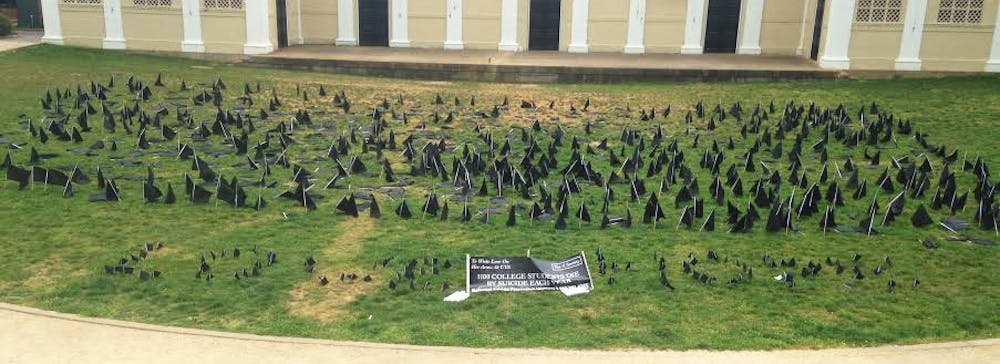From April 25-27, 1,100 black flags filled the Amphitheatre to represent the number of college students in the United States who die by suicide each year, according to the sign accompanying the display.
To Write Love On Her Arms, an organization that supports those who suffer from mental illness, addiction and self-harm, placed the flags in the Amphitheatre with the support of the secretive Z Society.
Second-year College student Megan Mason Dister, vice president of To Write Love On Her Arms at the University, said the purpose of the display is to raise awareness of college students’ struggles with mental illness and remind those suffering that help is available.
“We wanted to … raise awareness that suicide is a really big problem, especially for college students,” Dister said. “[We wanted] to make people realize that they’re not alone in their suffering, that help is available and that mental health resources are around on Grounds and in the Charlottesville community.”
Dister said To Write Love On Her Arms is a national organization that seeks to educate students about mental illness and self-harm. It also provides resources for suicide prevention and mental health wellness.
“On the wall of the Amphitheatre, we have a poster that says [the organization’s] message, ‘Hope is real, Help is real,’” Dister said. “The goal of To Write Love On Her Arms is to promote hope. [The founder] wanted to create this community of hope where people could go and be together and learn about mental illness and promote suicide prevention.”
Second-year College student Audrey Stephenson has noticed the flags and said they bring awareness to the struggles that every student faces during college, even if those students sometimes seem okay.
“Someone could appear completely happy, but they actually [are having] bad thoughts,” Stephenson said. “It’s a good reminder to look out for our friends and to check on people.”
Dister said she hopes that, from this event, students understand how big of an impact mental health has on the college student.
“We hope that students realize that mental illness is a really big issue in college, especially with young adults,” Dister said. “We need to be there to support one another and to just educate the community about the resources that are available.”







